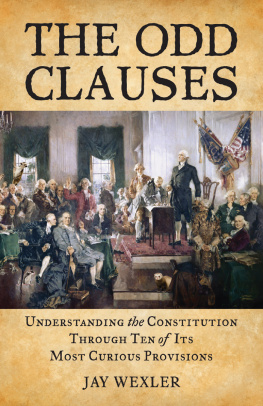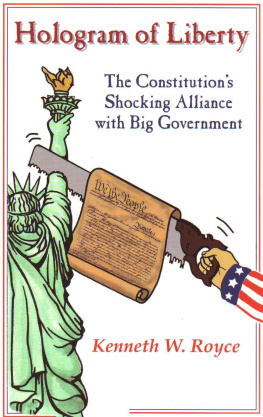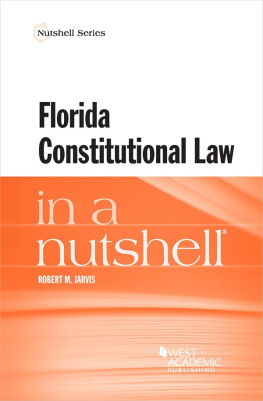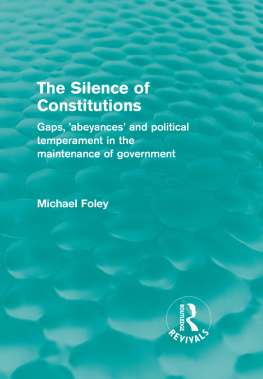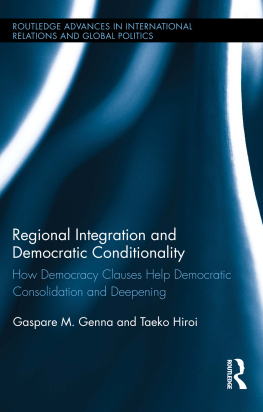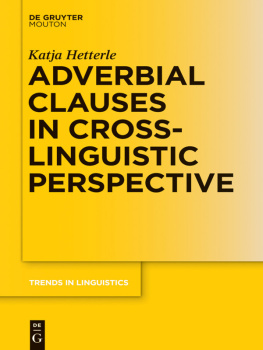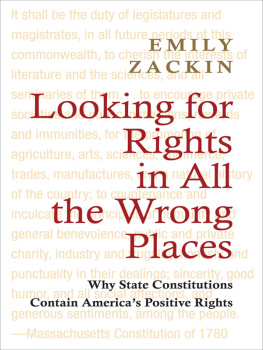The Odd Clauses
Understanding the Constitution through Ten of Its Most Curious Provisions
Jay Wexler
BEACON PRESS
BOSTON
Beacon Press
25 Beacon Street
Boston, Massachusetts 02108-2892
www.beacon.org
Beacon Press books
are published under the auspices of
the Unitarian Universalist Association of Congregations.
2011 by Jay Wexler
All rights reserved
Printed in the United States of America
14 13 12 11 8 7 6 5 4 3 2 1
This book is printed on acid-free paper that meets the uncoated paper ANSI/NISO specifications for permanence as revised in 1992.
Text design and composition by
Wilsted & Taylor Publishing Services
Library of Congress Cataloging-in-Publication Data
Wexler, Jay.
The odd clauses : understanding the Constitution
through ten of its most curious provisions / Jay Wexler.
p. cm.
Includes bibliographical references and index.
E-ISBN 978-0-8070-0091-5
ISBN 978-0-8070-0090-8 (hardback : alk. paper)
1. Constitutional lawUnited States. I. Title.
KF4550.W465 2011
342.7302dc22 2011012339
For my father and Mary
Contents
Introduction
The Constitution of the United States contains some of the most powerful and well-known legal provisions in the history of the world. The First Amendment, for example, gives us the right to speak our minds without government interference. The equal protection clause of the Fourteenth Amendment stops the state from discriminating against us because of our race or gender. And the Fourth Amendment, as our television crime dramas continually remind us, prevents the police from searching our homes without a warrant. I would bet that in the past twenty years, several hundred books have been written about these important clauses, and for good reason. This book, however, is not one of them.
Instead, this book will shine a much-deserved light on some of the Constitutions lesser-known clausesits benchwarmers, its understudies, its unsung heroes, its crazy uncles. To put it another way, if the Constitution were a zoo, and the First, Fourth, and Fourteenth amendments were a lion, a giraffe, and a panda bear, respectively, then this book is about the Constitutions shrews, wombats, and bat-eared foxes. And believe me, if youve never laid eyes on a bat-eared fox before, you are in for a treat.
The idea for The Odd Clauses descended upon me about a decade ago. I was working as a lawyer in a small office in the United States Department of Justice called the Office of Legal Counsel. The OLC, as its known, is the office that is primarily responsible for advising parts of the executive branchfrom the various administrative agencies to the attorney general to the White House itselfon issues of constitutional law. You may recall how the OLC made headlines when (long, long after I left) it issued the so-called torture memo to justify some of George W. Bushs more extreme foreign policy strategies. When I was at the office, a lot of our work involved reviewing bills to see if they raised any constitutional problems. Sometimes we provided informal advice to an agency head or White House bigwig. Other times, we would write more formal legal opinions on issues that came up in the day-to-day life of the executive branch: Can the president withhold information about a pardon decision from curious members of Congress? Can the president designate a national monument in the middle of the ocean? When (if ever) can presidents refuse to enforce a law that they genuinely believe is unconstitutional?
Like most lawyers, I had taken my share of constitutional law classes while in law school, which means that, for the most part, I had studied the big-time clausesthe constitutional lions, tigers, and bears. I had taken the obligatory Introduction to Constitutional Law course in my first year and learned about the due process and equal protection clauses. In my second year, I learned about freedom of speech and religion in a course on the First Amendment. The Fourth, Fifth, and Sixth amendments were the topics of a third-year course in criminal procedure. Because I had a special interest in constitutional law and had heard great things about the professor, I also took a course in voting rights, which involved studying a few obscure parts of the Constitution, like the clause in Article IV which says that the United States shall guarantee to Every State in this Union a Republican Form of Government, but which does not, thank goodness, have anything to do with the Republican Party.
In other words, even though I studied a good deal of constitutional law during my three years in law school, I graduated without knowing anything about most of our founding document. The Constitution, including its twenty-seven amendments, has thousands of words in it, but the well-known parts, even if we generously assume that these include its general provisions establishing the governments three branches, make up only a small percentage of it. The rest of the text is a smorgasbord of clauses that hardly anybody ever talks about in law school, much less anyplace where normal people congregate.
As I quickly learned when I started working at OLC, however, some of these constitutional shrews are incredibly important. Although we worked on plenty of due process and free speech issues, we spent at least as much of our time on parts of the Constitution that I had never run into before. Who knew how much effort an office could exert thinking about the recommendations clause of Article II, Section 3specifically, whether its mandate that the president recommend to members of Congress such Measures as he shall judge necessary (emphasis mine) renders unconstitutional laws that require the president to make policy recommendations to Congress? Who knew how high tensions could flare over the question of what makes someone an inferior officer under the exceptions clause to Article IIs appointments clause, such that he or she might be appointed by someone other than the president? Part of the reason nobody studies these things in law school is that law professors tend to use judicial decisions to teach the law. For a variety of procedural and other reasons, however, many of the Constitutions odd clausesparticularly those that allocate power between the branchesnever make it to any court. No court means no judicial opinion means nobody in law school thinks about it. But that doesnt mean the clauses do not play extremely significant roles in shaping the nations constitutional democracy.
It was about a year after I started working at OLC that the idea for the book hit me. I remember the exact day. Bill Clinton was on a trip in Africa, and a village wanted to make him an honorary something or other. The president wondered whether this would violate the title of nobility clauses, which prohibit officers of the United States from accepting any office or title from any King, Prince, or foreign state. The question had to be figured out fairly quickly, so the question came to our office. One of my colleagues was assigned the issue, and in my head I can still see her running around from office to office frantically asking if anyone knew anything about what the title of nobility clauses did and did not prohibit. I had never heard of the title of nobility clauses, so I was no help to my friend. Indeed, I dont recall ever hearing what the answer to the question turned out to be, but I do remember formulating a vague plan that very afternoon to someday write a book about these odd constitutional creatures.

